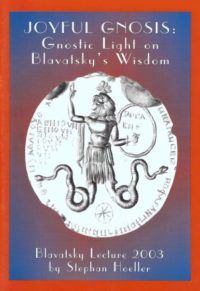Joyful Gnosis: Gnostic Light on Blavatsky’s Wisdom
25 Pages | Sunday July 27th, 2003 | Softcover | Theosophical Publishing House, London | No ISBN.
The Blavatsky Lecture delivered at the Summer School of The Theosophical Society in England, the University of Loughborough.
An exploration of Helena Petrovna Blavatsky's (1831 - 1891) teachings in the light of the embodiment of the Ancient Wisdom known as Gnosticism. The title of this lecture alludes to three specific topics:
- The teachings of the foundress and principal teacher of what has been called Modern Theosophy.
- The earlier embodiment of the Ancient Wisdom Tradition known as Gnosticism.
- The character of this same Wisdom tradition described here as 'joyful Gnosis'.
From page 5:
" Gnosticism is the teaching based on Gnosis, the knowledge of transcendence arrived at by way of interior, intuitive means. Although Gnosticism thus rests on personal religious experience, it is a mistake to assume all such experience results in Gnostic recognitions. It is nearer the truth to say that Gnosticism expresses a specific religious experience, an experience that does not lend itself to the language of theology or philosophy, but which is instead closely affinitized to, and expresses itself through, the medium of myth. Indeed, one finds that most Gnostic scriptures take the forms of myths. The term 'myth' should not be taken to mean 'stories that are not true', but rather, that the truths embodied in these myths are of a different order from the dogmas of theology or the statements of philosophy. "
 Bezig met bijwerken...
Bezig met bijwerken...